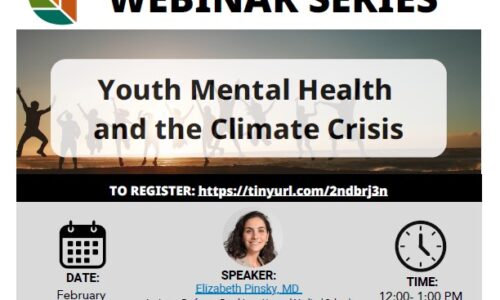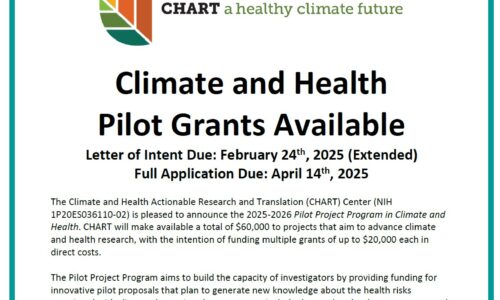News

CHART Announces New Pilot Grant Awardees
CHART is pleased to welcome its first pilot grant recipients. The CHART Research Capacity Building Core has awarded a pilot grant to two compelling projects.
Every year, CHART plans to host the Pilot Project Program, which aims to build research capacity by providing funding for innovative pilot proposals that intend to generate new knowledge about the health risks associated with climate change in urban areas, particularly those related to heat exposure. The program also seeks to translate this new knowledge into action through equitable partnerships that enhance health. It is designed to support the generation of new data, the testing of novel methods, and the establishment of new partnerships needed to develop larger external grant proposals.
The grantees were selected based on their overall impact and their potential to become NIEHS R-level applicants. One of the central goals of CHART is to build the capacity of investigators to successfully compete for National Institute of Environmental Health Sciences (NIEHS)-funded R-level research awards. Other factors such as significance, innovation, approach, investigators, and an alignment with CHART’s other goals, were taken into consideration.
Read about the two new pilot grant projects:
Assessing the combined effects of air pollution and climate change enhanced urban heat to the health of outdoor informal workers
Project Overview: Enhanced by climate change and weak environmental policies, air pollution impacts on community health in low-and middle-income countries have the potential to trigger multiple diseases, particularly for individuals who are disproportionately exposed. The project will assess the potential health impacts on outdoor informal workers due to the combined effects of air pollution and urban heat in the context of climate change through measurement of inhalable PM2.5 where outdoor workers conduct their activities and an exposure assessment of PM2.5 and heat related health risks for street vendors.
Institutions: University of Georgia, Universidad Católica Boliviana, Universidad de Chile
Olivia Ginn: An Assistant Professor at the University of Georgia in the school of Engineering and the Institute of Bioinformatics, Dr. Ginn’s research addresses humanitarian and environmental challenges related to public health through the integration of engineering, microbiology, and environmental science. Specifically, her lab studies air and water in contaminated systems across the globe.
Carolina Garvizu: Dr. Garvizu is an Environmental Engineer with a master’s degree in water technology research in a joint program between UCB (Bolivia) and Valencia Polytechnic University (Spain). She is a researcher of the Center for Research in Water, Energy and Sustainability (CINAES) of the Environmental Department at UCB.
Freddy Soria: Dr. Soria is a Civil and Environmental Engineer with experience in mathematical modeling, water resources evaluation, remote sensing, and climate change. His fields of interest are capacity building, education, water-hygiene, and sanitation.
Karla Yohannessen: Assistant Professor in the Epidemiology Program of the School of Public Health, University of Chile. She studies topics related to the health effects of environmental exposures, especially air pollution and extreme heat, and environmental and public health.
At the intersection of extreme weather and the Brumadinho mining disaster: challenges of climate change in the face of other anthropogenic environmental threats
Project Overview: In January 2019, the dam at the Córrego do Feijão mine in Brumadinho, Minas Gerais, Brazil collapsed, sending a torrent of toxic sludge into the surrounding areas, killing 270 people and contaminating the Paraopeba River. Exacerbating potential health effects of the disaster are yearly extreme storms and flooding of the Paraopeba river, bringing contaminated soil and mosquito breeding sites to people’s door steps. Our aim, therefore, is to describe and quantify health effects of both the mine disaster as well as frequent climate-change related heavy rain and flooding in residents in peri-urban neighborhood along the Paraopeba river.
By quantifying levels of key heavy metals and metalloids (lead, arsenic, mercury, cadmium, manganese) in 150 children in this community and a control community, we will have baseline data that will allow us to design a longitudinal study that will highlight the impacts of these environmental threats on impacted communities. We will also look for patterns of infectious diseases’ exposure by analyzing reported arboviral infections over the last several years in two affected municipalities, incorporating climate and weather conditions into a fine-temporal scale epidemiological model.
Institutions: Emory University;Unifenas Universidade, Belo Horizonte, Brazil; and Universidade Federal de Minas Gerais, Belo Horizonte, Brazil
Jessica Fairley: Dr. Jessica Fairley is Associate Professor of Medicine, Global Health, and Epidemiology at Emory University. She is an infectious disease physician and researcher with a strong track record in epidemiologic research of neglected tropical diseases in the US and Latin America including PI of a multinational R01 on leprosy and other NTDs in Brazil. Her research centers on the epidemiology, host-pathogen interactions, and impact of neglected, tropical or emerging infectious diseases across unique and / or vulnerable populations globally and locally. She also incorporates the intersection of climate change, planetary health, and infectious diseases and has projects on immigrant communities, neglected tropical diseases and climate vulnerabilities as well as extreme weather and arboviral epidemiology in Georgia. She has taught courses on Global Health, Infectious Diseases, and Planetary Health at the Rollins School of Public Health.
Uriel Kitron: Uriel Kitron, PhD, MPH is an environmental epidemiologist and vector ecologist and has decades of experience in the area of infectious disease epidemiology and the environment. His research and teaching programs center around the eco-epidemiology of infectious diseases, with an emphasis on tropical and emerging diseases and environmental risk factors, and on an interdisciplinary approach to the challenges of the Anthropocene. His global health and development research, emphasizes anthropogenic changes, including issues of climate, urbanization, agricultural practices and conservation.
Recent & Related News

On-Demand CHART Webinar Series Materials

Recording Available – CHART Webinar Series: Youth Mental Health and the Climate Crisis

CHART Climate and Health Pilot Grants Available 2025


